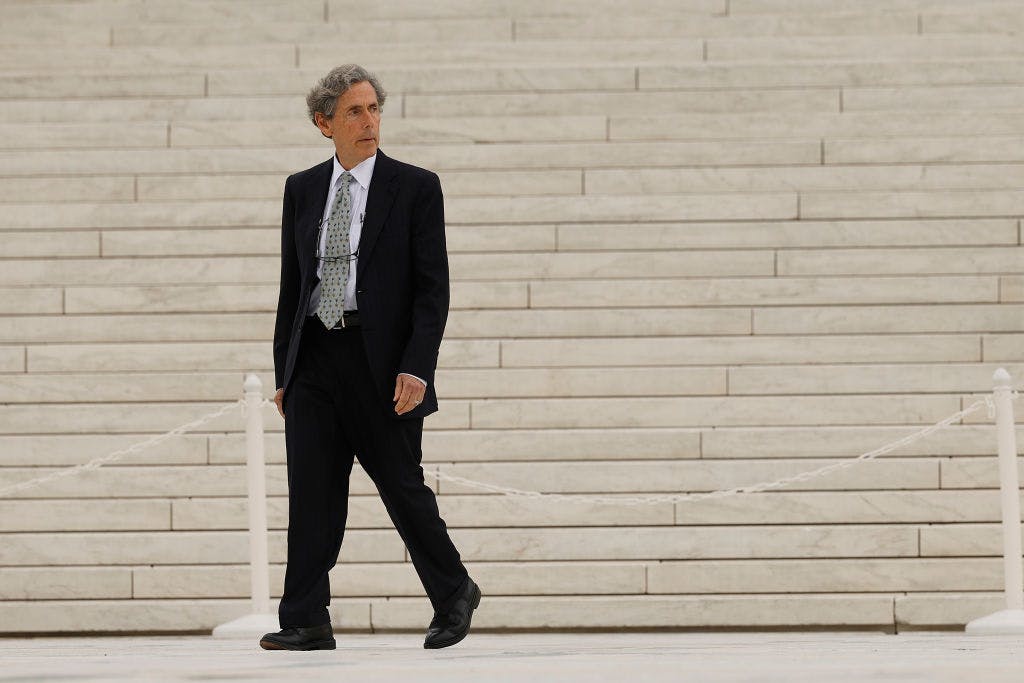The Man Who Ended Affirmative Action in the Classroom Sets His Sights on the Private Sector
The reformer Edward Jay Blum is hoping to replicate his success is ending affirmative action in higher education admissions.

The reformer who has for decades tried to end affirmative action in college admissions, only to succeed this year, Edward Jay Blum, is now taking aim at two law firms, hoping to end what he calls “rank discrimination” in racially conscious hiring practices in the private sector.
One lawsuit accuses the firm Perkins Coie of “racially discriminating against future lawyers for decades.” The fellowships that Perkins Coie offers to first- and second-year law students, which only consider “students of color,” “students who identify as LGBTQ+,” and “students with disabilities,” are meant to “exclude certain applicants based on their skin color,” the lawsuits states. The legal brief also states the fellowships are “six-figure jobs.”
“So between two heterosexual, nondisabled applicants — one black and one white — the latter cannot apply based solely on his race,” the lawsuit states. The challenge to Perkins Coie was filed in the United States District Court for the Northern District of Texas.
Perkins Coie says it plans to fight Mr. Blum’s lawsuit aggressively. “As a firm, we have been a leader in efforts to promote diversity, equity, and inclusion in the legal profession,” the firm said in a statement to the Wall Street Journal. “Our commitment to those values remains steadfast. We will defend this lawsuit vigorously.”
Mr. Blum also is suing the international firm Morrison and Foerster over its Keith Wetmore 1L Fellowship for Excellence, Diversity, and Inclusion. “Applicants do not qualify unless they are ‘African American/Black, Latinx, Native Americans/Native Alaskans, and/or members of the LGBTQ+ community,’” the lawsuit, filed in the federal district court at Miami, states.
Earlier this year, Mr. Blum won two major cases before the justices of the Supreme Court, Students for Fair Admissions v. Harvard and Students for Fair Admissions v. University of North Carolina. The justices, in a 5-to-3 decision in the Harvard case and a 6-to-3 decision in the North Carolina case, held that the explicit consideration of race in university admissions is a violation of applicants’ rights.
Chief Justice Roberts wrote for the majority that universities have “concluded, wrongly, that the touchstone of an individual’s identity is not challenges bested, skills built, or lessons learned but the color of their skin. Our constitutional history does not tolerate that choice.”
Mr. Blum is now hoping to repeat his success in the Harvard and North Carolina cases. He did not immediately respond to a request for comment.
The challenge states that the Perkins Coie’s fellowships violate the Constitution, Title VI of the Civil Rights Act, and federal laws. Mr. Blum, in this case, represents someone named only as “Member A” of his organization, the American Alliance for Equal Rights.
“Member A satisfies all the criteria for the 1L fellowship, except the discriminatory one,” the lawsuit states. “As a white, non-disabled, heterosexual man, he does not belong to a group historically underrepresented in the legal profession.”
The lawsuit states that Member A is an individual with high academic achievement and leadership experience who worked as a “long-time paralegal.” He would use the money from the Perkins Coie fellowship to pay off debt and pay for his daughter’s daycare, the lawsuit claims. Alumni of the fellowship are also offered full-time positions following their graduation from law school, with starting salaries nearing $200,000.
Mr. Blum’s lawsuit against Morrison and Foerster makes similar claims, again representing an individual known as “Member A” who wishes to apply for the firm’s fellowship at Miami but cannot because “he does not belong to a group historically underrepresented in the legal profession.”
The lawsuit identifies Member A as an Ivy League alumnus who “is an accomplished writer — authoring a best-selling book, high-level research papers, and numerous op-eds — who focuses on policy issues, including diversity and race.”
_________
Correction: Reformer is the correct description for Edward Jay Blum. His profession was incorrectly reported in the bulldog.

